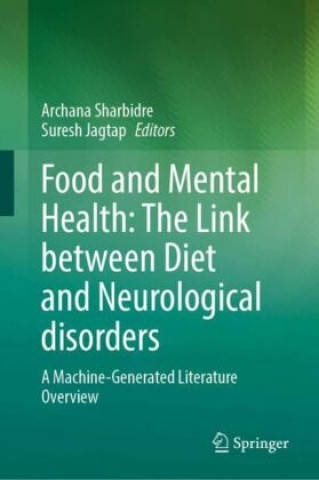
Kód: 44230467
Food and Mental Health: The Link between Diet and Neurological disorders
Autor Archana Sharbidre, Suresh Jagtap
Diet is frequently the first thing that comes to mind when discussing our health. We all know that eating healthy can help us stay fit and prevent disease as the health of a person is highly depending on the type of diet consumed. ... celý popis
- Jazyk:
 Angličtina
Angličtina - Vazba: Pevná
- ISBN-13: 9783031469091
Nakladatelství: Springer, Berlin, 2024
- Více informací o knize

Mohlo by se vám také líbit
-

Dune
262 Kč -

Haunting Adeline
617 Kč -

Berserk Deluxe Volume 2
1050 Kč -

White Nights
90 Kč -

Powerless
259 Kč -

Atomic Habits
340 Kč -

Dune Messiah
178 Kč -

Berserk Deluxe Volume 3
1138 Kč -

One Day
276 Kč -

Berserk Deluxe Volume 1
1033 Kč -

Iron Flame
353 Kč -

Surrounded by Idiots
256 Kč -

Harry Potter and the Prisoner of Azkaban (Minalima Edition)
688 Kč -

Gravity Falls Journal 3
440 Kč -

Heaven Official's Blessing: Tian Guan Ci Fu (Novel) Vol. 1
426 Kč -

The Creative Act
544 Kč -

Dune
214 Kč -

Hunting Adeline
633 Kč -

A Little Life
276 Kč -

Children of Dune
174 Kč -

Heaven Official's Blessing: Tian Guan Ci Fu (Novel) Vol. 2
441 Kč
Dárkový poukaz: Radost zaručena
- Darujte poukaz v libovolné hodnotě a my se postaráme o zbytek.
- Poukaz se vztahuje na celou naši nabídku.
- Elektronický poukaz vytisknete z e-mailu a můžete ihned darovat.
- Platnost poukazu je 12 měsíců od data vystavení.
Informovat o naskladnění knihy
Zadejte do formuláře e-mailovou adresu a jakmile knihu naskladníme, zašleme vám o tom zprávu. Pohlídáme vše za vás.
Více informací o knize Food and Mental Health: The Link between Diet and Neurological disorders
Nákupem získáte 449 bodů
 Anotace knihy
Anotace knihy
Diet is frequently the first thing that comes to mind when discussing our health. We all know that eating healthy can help us stay fit and prevent disease as the health of a person is highly depending on the type of diet consumed. Earlier, the diet was considered to be only impacting the heart health, but now, several evidences advocate that it also has a great role in brain health. Thus, what we eat can impact our brains function. Our eating habits have an effect on how our brains work. Consuming unhealthy meals, such as processed food or sugary snacks, can cause the inflammation interfering with the brain's capacity to connect with other organs. This disruption in communication results in reduced cognitive function due to oxidative stress, neuroinflammation, and mitochondrial dysfunction involved in the aetiology of many neurological illnesses. The gastrointestinal tract (GIT), which has the biggest and most exposed surface and desired properties to detect food, nutrients, and environmental variables as well as to distinguish commensals, invading pathogens, and others, includes the gut microbiome as an essential component. The relationship between the stomach and the central nervous system (CNS) in terms of health and sickness is well-known. Normal brain and emotional functioning depend on a healthy gut with a variety of microorganisms. Moreover, the majority of GI physiology is managed by the CNS. In order to maintain gut homeostasis and appropriate digestion, a complex and bidirectional molecular connection exists between the CNS and the gut/microbiome. In addition, a number of mechanisms, such as endocrine, neuronal, toll-like receptor, and metabolites-dependent pathways, have been postulated. Because changes in the bidirectional interaction between the GIT and the CNS are associated with the pathophysiology of gastrointestinal and neurological illness.Changing Lifestyle and health behaviors such as diet can be predominantly effective public health targets for disease prevention. There is increasing evidences that dietary interventions including dietary supplement and dietary restriction can prevent or even reverse the cognitive deficits seen in neurological disorders such as age-related cognitive decline, Alzheimer's disease, Parkinson's disease, stroke, epilepsy, traumatic brain injury, amyotrophic lateral sclerosis, Huntington's disease and multiple sclerosis and epilepsy that display this pathophysiology. There is now substantialevidence that diet promotes prevention and correction of neurological symptoms in a variety of pathological conditions.It also emphasizes the critical role of several possible routes for nutrient delivery to the risk of neurologic disease and treatment response, including metabolic management, epigenetic alteration, neuroinflammation, and gut-brain axis. The unique idea that dietary nutrition supplementation alters the metabolism-epigenetics-immunity loop to treat brain dysfunction is highlighted last. The metabolism, epigenetics, and immune networks will be the focus of a novel strategy for overcoming neurological deficiencies.Diets based on plants, wild vegetables, low in fat, high in fiber, antioxidant-rich especially polyphenols, and adopting other healthy lifestyle choices may help to lessen the severity and impairment of common neurological illnesses. Such a diet is the ketogenic diet, which is preferred for the treatment of refractory epilepsy. Multiple pathophysiological pathways are shared by a variety of neurological illnesses, including increased oxidative stress, neuroinflammation, and disrupted metabolism. Dietary treatments may affect these pathophysiological functions and consequently improve or worsen clinical results. A spectrum of healthy lifestyle choices must include adequate nutritional choices.
 Parametry knihy
Parametry knihy
Zařazení knihy Knihy v angličtině Mathematics & science Biology, life sciences Life sciences: general issues
4486 Kč
- Plný název: Food and Mental Health: The Link between Diet and Neurological disorders
- Podnázev: A Machine-Generated Literature Overview
- Autor: Archana Sharbidre, Suresh Jagtap
- Jazyk:
 Angličtina
Angličtina - Vazba: Pevná
- EAN: 9783031469091
- ID: 44230467
- Nakladatelství: Springer, Berlin
- Rozměry: 235 × 155 mm
- Datum vydání: 18. February 2024
Osobní odběr Praha, Brno a 12903 dalších
Copyright ©2008-24 nejlevnejsi-knihy.cz Všechna práva vyhrazenaSoukromíCookies



 Vrácení do měsíce
Vrácení do měsíce 571 999 099 (8-15.30h)
571 999 099 (8-15.30h)